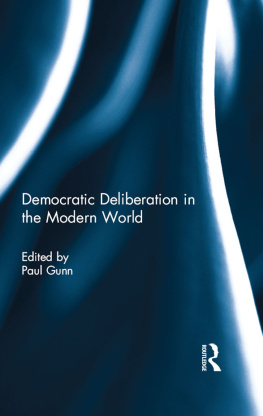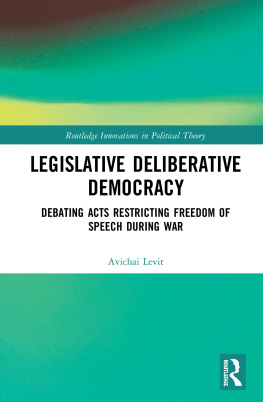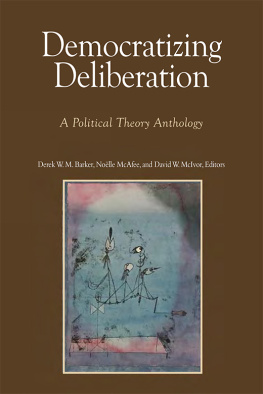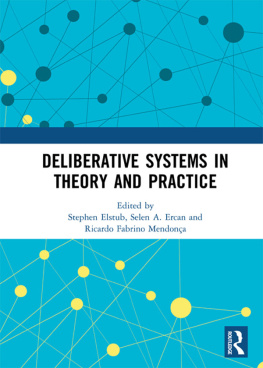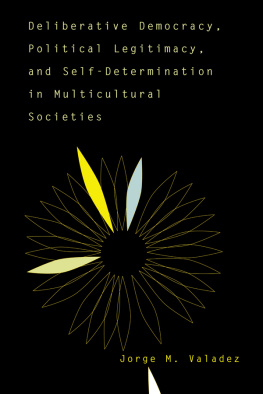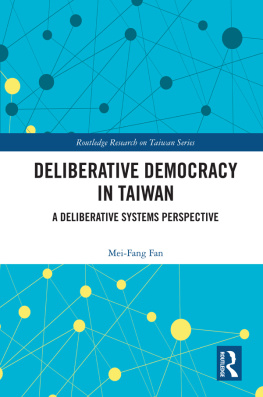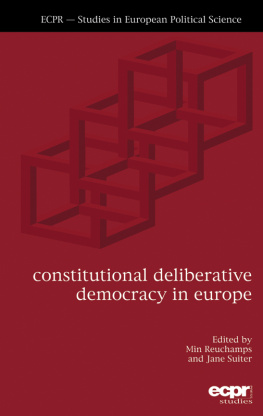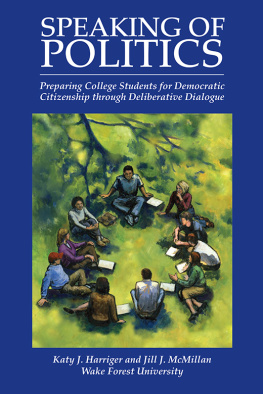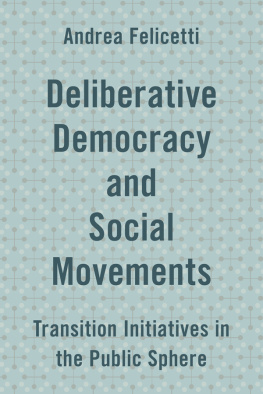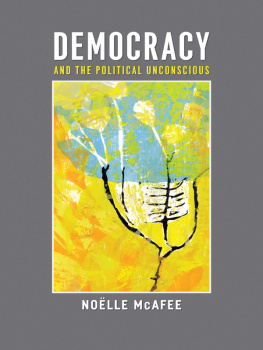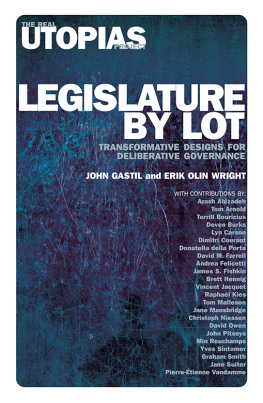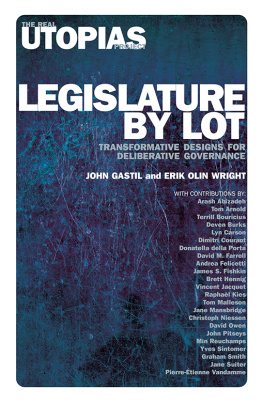Democratic Deliberation in the Modern World
Would ordinary citizens benefit if public decisions were increasingly based on an inclusive and fair exchange of reasons rather than mere voting or choices in the market? Debates amongst deliberative democrats often proceed as though this process of public reasoning is precisely what the democratic ideals of freedom and equality require. Less attention has been paid to whether an inclusive and fair exchange of reasons is possible in any realistic modern setting, and what the effects would be of trying to move democratic institutions in a deliberative direction. To examine these effects, the contributors to this collection of essays bring together a number of analyses of the practical implications of expanding deliberative processes. Some consider the prevailing epistemic conditions in modern societies and their likely effects on deliberative reasoning. Others discuss the politics of these societies, and especially the likely effects of existing political divisions on democratic deliberation. Lastly, the question of what we might hope to seeand what we might hope to avoidfrom political argument is addressed. Considered together, these three foci should equip readers to decide whether deliberative democracy is feasible and, if so, if it is desirable. This book was published as a special issue of Critical Review.
Paul Gunn is Lecturer in Political Economy at Goldsmiths, University of London. He holds a PhD from Queen Mary, University of London, and his research interests concern the implications of social complexity on institutional choice and performance.
Democratic Deliberation in the Modern World
Edited by
Paul Gunn
First published 2014
by Routledge
2 Park Square, Milton Park, Abingdon, Oxon, OX14 4RN
Simultaneously published in the USA and Canada
by Routledge
711 Third Avenue, New York, NY 10017
Routledge is an imprint of the Taylor & Francis Group, an informa business
2014 Critical Review Foundation
All rights reserved. No part of this book may be reprinted or reproduced or utilised in any form or by any electronic, mechanical, or other means, now known or hereafter invented, including photocopying and recording, or in any information storage or retrieval system, without permission in writing from the publishers.
Trademark notice: Product or corporate names may be trademarks or registered trademarks, and are used only for identification and explanation without intent to infringe.
British Library Cataloguing in Publication Data
A catalogue record for this book is available from the British Library
ISBN 13: 978-0-415-70285-0
Typeset in Garamond
by Taylor & Francis Books
Publishers Note
The publisher accepts responsibility for any inconsistencies that may have arisen during the conversion of this book from journal articles to book chapters, namely the possible inclusion of journal terminology.
Disclaimer
Every effort has been made to contact copyright holders for their permission to reprint material in this book. The publishers would be grateful to hear from any copyright holder who is not here acknowledged and will undertake to rectify any errors or omissions in future editions of this book.
Contents
Paul Gunn
Russell Muirhead
Mark Pennington
Manfred Prisching
David Schkade, Cass R. Sunstein, and Reid Hastie
Ilya Somin
Robert B. Talisse
Geoffrey M. Vaughan
The chapters in this book were originally published in Critical Review, volume 22, issue 23 (October 2010). When citing this material, please use the original page numbering for each article, as follows:
Chapter 2
Can Deliberative Democracy Be Partisan?
Russell Muirhead
Critical Review, volume 22, issue 23 (October 2010) pp. 129158
Chapter 3
Democracy and the Deliberative Conceit
Mark Pennington
Critical Review, volume 22, issue 23 (October 2010) pp. 159184
Chapter 4
Rational Democracy, Deliberation, and Reality
Manfred Prisching
Critical Review, volume 22, issue 23 (October 2010) pp. 185226
Chapter 5
When Deliberation Produces Extremism
David Schkade, Cass R. Sunstein, and Reid Hastie
Critical Review, volume 22, issue 23 (October 2010) pp. 227252
Chapter 6
Deliberative Democracy and Political Ignorance
Ilya Somin
Critical Review, volume 22, issue 23 (October 2010) pp. 253280
Chapter 7
An Epistemological Defense of Democracy
Robert B. Talisse
Critical Review, volume 22, issue 23 (October 2010) pp. 281292
Chapter 8
Incommunicative Action: An Esoteric Warning about
Deliberative Democracy
Geoffrey M. Vaughan
Critical Review, volume 22, issue 23 (October 2010) pp. 293309
Please direct any queries you may have about the citations to clsuk.permissions@cengage.com
Paul Gunn
Deliberative democracy is a difficult concept to define. In one way or another, deliberation and its close cousins communication and contemplation have been central to the practice of democracy since its emergence in ancient Athens. How much we emphasise deliberation, and the implications we draw from it, therefore depend upon how we, as theorists, position ourselves in relation to different historical ideals. To take but one example, Philip Pettits (1997) neo-republican approach to democracy, which emphasises deliberation and participation as bulwarks against domination, stands in sharp contrast to Benjamin Barbers ([1984] 2003, passim) strong conception of democracy, which conceives of such participation as a means to the reinvigoration of a Jeffersonian idea of self-government.
This historical contextualisation suggests that one way of imposing order on the unruly definitions of deliberative democracy is to focus on contemporary democratic government, since this has provided the contextual backdrop against which modern democratic theories have developed. Early democratic accounts, such as Aristotles (fourth century BC) identification of the disciplinary effects of deliberation or T. H. Greens (nineteenth century) focus on its emancipatory promise, tend to conceive of deliberation simply in relation to individual behavior and autonomy. Regardless of whether the state was a large part of life (as it was for Aristotle) or small (as for Green), its comparative scope was limited, so there was little need to theorize anything other than a direct connection between political processes and individual outcomes. In contrast, the world for which modern deliberative accounts are offered is defined by a mixture of dynamic and often remote institutions which, together, contour our choices and opportunities in complicated and obscure ways. In the latter half of the twentieth century in particular, governments have grown in scope and complexity in response to these wider developments to such an extent that even the proto-deliberative theories of progressives such as L. T. Hobhouse and John Dewey are now of questionable relevance in their raw form. Modern deliberative democrats accordingly seek to avoid treating the state as the embodied will of the people. Instead, they confront it as a set of more or less opaque institutions which stands apart from the people and which consequently needs direction and legitimation.

